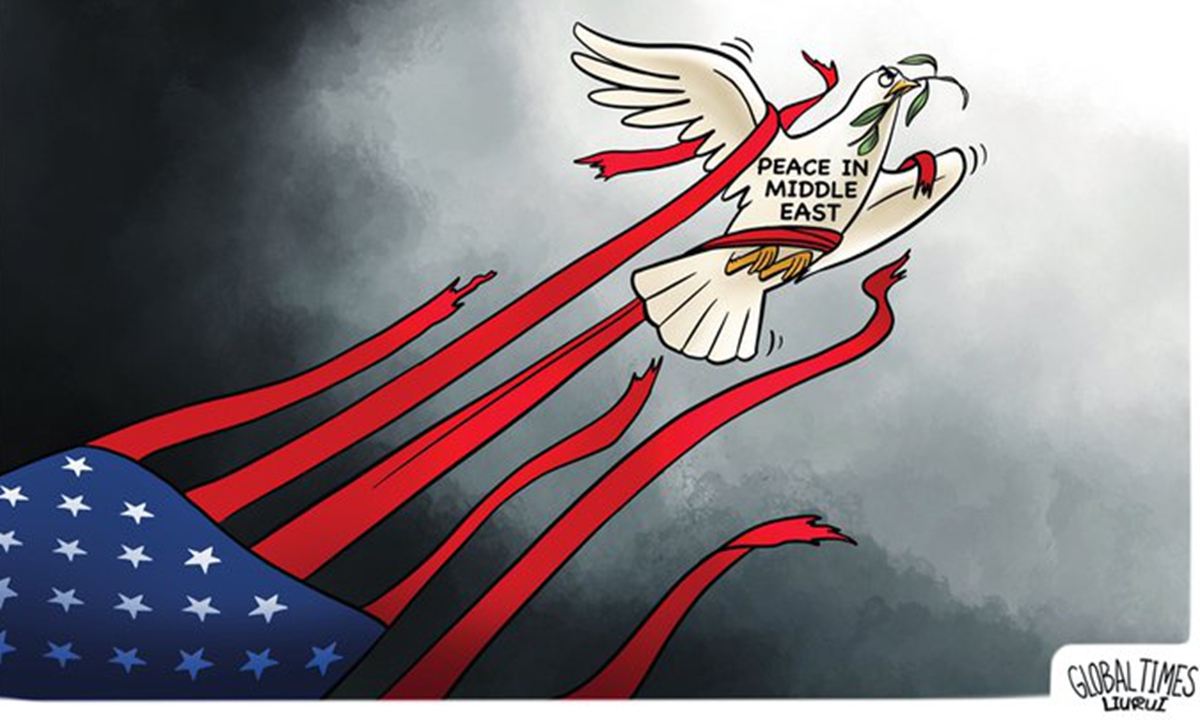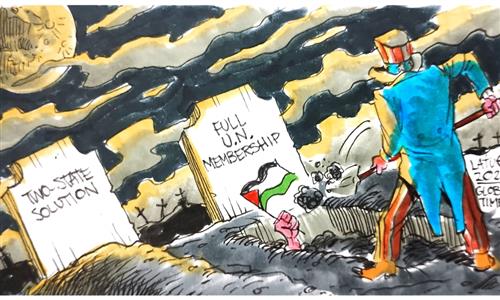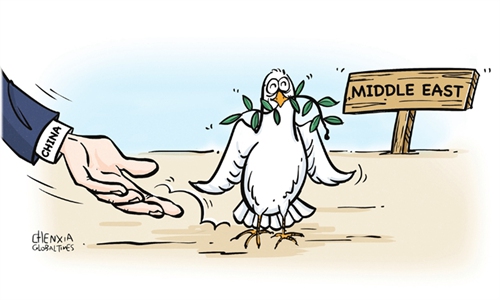
Illustration: Liu Rui/Global Times
In April, the UN Security Council rejected Palestine's request for full UN membership, with the US casting a veto. This is hardly surprising as the veto had been expected ahead of the vote, shattering the Palestinians' long-held dream of becoming an independent state with UN recognition.
This is the second Palestinian bid for full membership and it comes as the fighting in Gaza has put the more than 75-year-old Palestine-Israel conflict at center stage. It is disappointing that this widely backed resolution, with 12 members of the 15-member Council voting in favor, was once again blocked by a single country. Washington's opposition is mainly grounded on two reasons. First, it says that establishing an independent Palestinian state should happen through direct negotiations between the parties, and not at the UN. Second, it claims that a full Palestinian membership would not help lead to a two-state solution.
Such arguments, however, hardly hold up.
First, there is a strong moral imperative for recognizing Palestinian statehood, and the UN is exactly the place where Palestine should have the same status as Israel. Moreover, the Palestinian people should enjoy the same rights as the Israeli people. Back in 1947, it was through a UN General Assembly (UNGA) resolution - Resolution 181 - that the State of Israel was established. In 1974, the UNGA adopted another resolution - Resolution 3236 - that reaffirmed the Palestinian people's right to national independence and sovereignty.
Today, Palestine, though a non-member observer state in the UN, is recognized as a sovereign state by the majority of the international community. Recently, Norway, Ireland and Spain have recognized the Palestinian State, bringing the total number to nearly 150, which reflects broad international consensus. And the raging Gaza conflict only lends new relevance and urgency to the legal status of Palestine. For too long, successive governments of certain countries have claimed to support a two-state solution, yet this claim rings hollow. As some still argue that it is not the time to recognize Palestinian statehood, we have to ask the question, if not now, when?
Second, Palestine's full UN membership would strengthen, not undermine the two-state solution, and the recognition of Palestinian rights is critical to any future negotiation. Peace negotiations would not be on an equal footing if there is an asymmetry of legal status. For the foreseeable future, one of the best ways to bring the two parties onto an equal footing is to show that Palestine enjoys legitimacy not only in the Islamic world and the Global South, but also globally, in places like the UN.
Third, there is the issue of the Palestinians, which is bigger than Palestine and Israel. To quote the words of UN Secretary-General Antonio Guterres, "Failure to make progress toward a two-state solution will only increase volatility and risk for hundreds of millions of people across the region, who will continue to live under the constant threat of violence." The future of Palestine is inseparable from the enduring peace and stability in the Middle East.
Not long ago, the UNGA adopted, with an overwhelming majority, a resolution that recommends the Security Council to give "favorable consideration" to full Palestinian membership. China gave its explicit support. Its ambassador to the UN "welcomed this historic resolution," stressing that it "reflects the will of the international community" and recognizing it as an effort to rectify the historical injustice suffered by the people of Palestine.
Though many argue that UNGA resolutions do not have the same binding effect as Security Council resolutions, the passing of this resolution matters as it generates a strong momentum across the international community to press for the recognition of Palestine as an independent state. It is a very clear signal to those who are against Palestinian membership that it is time to take Palestinian statehood seriously, and hopefully, as the Palestinian UN envoy puts it, the vote could be a future "investment in peace."
The author is a current affairs commentator based in Beijing. opinion@globaltimes.com.cn


